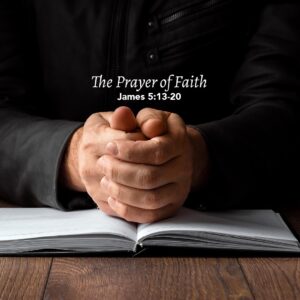James 5:13-20: The Prayer of Faith
October 12, 2023
TODAY'S BIBLE READING:
Jeremiah 30-31, Ecclesiastes 9, John 4:15-26, James 5:13-20

This passage is famous in prayer circles for its description of the “prayer of faith.” What does it mean? And how do we apply it today?
First of all, the prayer of faith is offered in response to a request from a member of the congregation made to the elders. James encourages prayer in all circumstances about all matters. But if someone is sick, he specifically says that we are to call the elders to pray and anoint with oil in the name of the Lord. To anoint with oil could be a way of saying that the elders are to encourage normal medical procedure as well as spiritual intervention (oil often being used as form of medical treatment in the ancient world). But more likely what is being said is that the person is symbolically set aside by an anointing with oil as a physical expression of a special prayer focus for that person. Then the elders are to pray, and it is the prayer of faith that will make the sick person well. At the very least, this means that such prayer is answered at the last day (“the Lord will raise them up”), but in all likelihood, it also means that on some occasions direct and real healing is also possible in answer to prayer. Clearly, not all prayers for physical health are answered; otherwise, no faithful Christian would ever die. But this “prayer of faith” is answered with physical healing in this life. God gives the elders who pray a special assurance that what is being prayed for will be done, and that prayer is answered according to God’s will.
In this context, sensitivity over sin and confession of sin is also healthy. Certainly not all physical suffering is as a consequence of a particular sin, but all suffering is as a consequence of the fall in the beginning. And where there is conviction of sin, it is another opportunity for such conviction to lead to confession and hence to forgiveness. To whom are we to confess our sins? Some church traditions have insisted that this confession of sins is only to the elders or their representatives – even constructing elaborate rituals around such confessions. Others have said that Christians are to confess their sins to each other in complete openness at all times. More likely, this text means that when there is a sin against another Christian, then that sin is to be confessed so that reconciliation can take place.
From this specific consideration of prayer, James then pulls back to consider the power of prayer as a whole – writing one of the most famous statements about prayer in the Bible: “The prayer of a righteous person is powerful and effective.” Reflecting then upon Elijah’s amazing example of prayer, those who read are motivated to pray earnestly too. If Elijah’s prayers were answered and he was a human just like us, can we not also boldly ask God to move in power today according to his will and for his glory?
And then finally, James turns again to the matter of sin and restoration. How great is the work of bringing a wandering sheep back to the fold! “Whoever turns a sinner from the error of their way will save them from death and cover over a multitude of sins.”
ABOUT THE AUTHOR
Josh Moody (Ph.D., University of Cambridge) is the senior pastor of College Church in Wheaton, IL., president and founder of God Centered Life Ministries, and author of several books including How the Bible Can Change Your Life and John 1-12 For You.
WANT MORE?
To receive God Centered Life devotionals directly in your inbox, as well as other resources, enter your email address in the form at the bottom of this page and click "subscribe."

